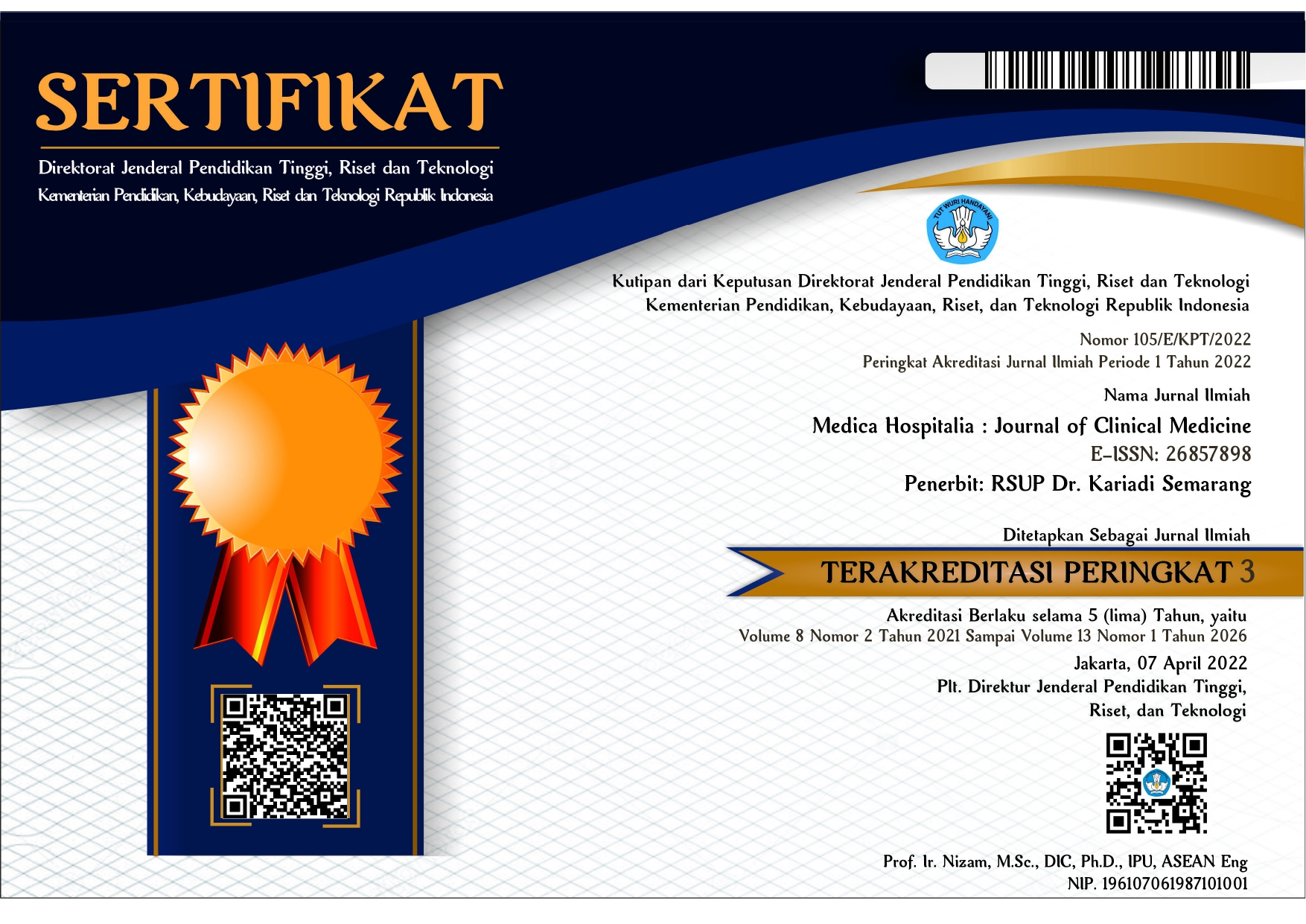Psychoneuroimmunology Aspects of COVID-19 Pandemic
DOI:
https://doi.org/10.36408/mhjcm.v7i1A.456Keywords:
COVID-19, psychoneuroimmunology, immune responses, anosmia, encephalitisAbstract
BACKGROUND: In December 2019 the world was struck by an outbreak of a disease in China which is now referred to as Coronavirus disease (COVID-19). COVID-19 disease is a viral infection caused by SARS-CoV-2. This disease has spread very quickly throughout the world, causing significant social and economic impacts. Now this incident is called a pandemic. There are many controversial theories up till now, especially about psychoneuroimmunology aspects. Symptoms caused by this disease vary greatly from the main attack of the respiratory system to neuro immunity system. Immune response is the key factor to invasion of this virus into the human body.
OBJECTIVE: The aim of this paper is providing comprehensive understanding regarding psychoneuroimmunology aspects of COVID-19 infection in those variable symptoms.
DISCUSSION: Neurological symptoms might start from anosmia, loss of taste (ageusia), delirium, encephalitis, Guillain-Barre syndrome, and stroke. Behavior might be affected with specific symptom such as depression and psychosis. Neuropsychiatric sequelae had been found in past viral pandemics.
CONCLUSION: Psychoneuroimmunology aspects will determine the variability of symptoms of each patient. Comprehensive understanding of psychoneuroimmunology perspective will aid in promoting post-pandemic public mental health in order to handle COVID-19 properly and minimize socio-economic impacts.
Downloads
References
2. WHO. WHO Director-General’s opening remarks at the media briefing on COVID-19 - 11 March 2020, www.who.int. Available at: https://www.who.int/dg/speeches/detail/who-director-general-s-opening-remarks-at-the-media-briefing-on-covid-19---11-march-2020 (Accessed: 3 June 2020).
3. Worldometer. Available at: https://www.worldometers.info/coronavirus (Accessed: 23 June 2020).
4. Kawal COVID-19. Kawal informasi seputar COVID-19 secara tepat dan akurat. Available at https://kawalcovid.id/. (Accessed 23 Juni 2020).
5. Lee Y, Min P, Lee S, Kim SW. Prevalence and Duration of Acute Loss of Smell or Taste in COVID-19 Patients. Journal of Korean medical science. 2020;35(18):e174. doi: 10.3346/jkms.2020.35.e174.
6. Troyer EA, Kohn JN, Hong S. Are we facing a crashing wave of neuropsychiatric sequelae of COVID-19? Neuropsychiatric symptoms and potential immunologic mechanisms. Brain, Behavior, and Immunity. 2020. doi: 10.1016/j.bbi.2020.04.027.
7. Rogers, J.P, Chesney, E., Oliver, D., Pollak, T.A., McGuire, P., Fusar-Poli, P., et al. Psychiatric and neuropsychiatric presentations associated with severe coronavirus infections: a systematic review and meta-analysis with comparison to the COVID-19 pandemic. The Lancet Psychiatry. 2020:1–17. doi: 10.1016/S2215-0366(20)30203-0.
8. Arpaci, I., Karata?, K., Balo?lu, M. The development and initial tests for the psychometric properties of the COVID-19 Phobia Scale (C19P-S). Personality and Individual Differences. 2020;164:110108. doi: 10.1016/j.paid.2020.110108.
9. Mao L, Jin H, Wang M, Hu Y, Chen S, He Q, et al. Neurological manifestations of hospitalized patients with coronavirus disease 2019 in Wuhan, China. JAMA Neurology. 2020. doi:10.1001/ jamaneurol.2020.1127.
10. Holmes EA, O’Connor RC, Perry VH, Tracey I, Wessely S, Arseneault L, et al. Multidisciplinary research priorities for the COVID-19 pandemic: a call for action for mental health science. Lancet Psychiatry. 2020. Published Online April 15. doi.org/10.1016/ S2215-0366(20)30168-1.
11. Li G, Fan Y, Lai Y, Han T, Li Z, Zhou P, et al. Coronavirus infections and immune responses. Journal of Medical Virology. 2020;92(4):424–432. doi: 10.1002/jmv.25685.
12. Felsenstein S, Herbert JA, McNamara PS, Hedrich CM. COVID-19: Immunology and treatment options. Clinical Immunology. 2020;215:108448. https://doi.org/10.1016/j.clim.2020.108448.
13. Filatov A, Sharma P, Hindi F, Espinosa PS. Neurological Complications of Coronavirus Disease (COVID-19): Encephalopathy. Cureus. 2020. doi: 10.7759/cureus.7352.
14. Montalvan V, Lee J, Bueso T, DeToledo J, Rivas K. Neurological manifestations of COVID-19 and other coronavirus infections: A systematic review. Clinical Neurology and Neurosurgery. 2020. doi: 10.1016/j.clineuro.2020.105921.
15. Yang Y, Shen C, Li J, Yuan J, Yang M, Wang F, et al. Exuberant elevation of IP-10, MCP-3 and IL-1ra during SARS-CoV2 infection is associated with disease severity and fatal outcome. medRxiv 2019. 2020.03.02.20029975. https://doi.org/10.1101/2020.03.02.20029975.
16. Hopkins C, Kumar N. Loss of sense of smell as marker of COVID-19 infection: joint statement from the British Rhinological Society and ENT-UK. 2020. Available at:www.entuk.org.
17. Xydakis MS, Dehgani-Mobaraki P, Holbrook EH, Geisthoff UW, Bauer C, Hautefort C, et al. Smell and taste dysfunction in patients with COVID-19. The Lancet Infectious Diseases. 2020;3099(20):30293. https://doi: 10.1016/S1473-3099(20)30293-0.
18. Marinosci A, Landis BN, Calmy A. Possible link between anosmia and COVID-19: sniffing out the truth. European Archives of Oto-Rhino-Laryngology. 2020. doi: 10.1007/s00405-020-05966-0.
19. Moriguchi T, Harii N, Goto J, Harada D, Sugawara H, Takamino J, et al. A first Case of Meningitis/Encephalitis associated with SARS-Coronavirus-2. Int. J. Neuropsychiatric sequelae of COVID-19. Infect. Dis. 2020;94:55-58. doi.org/10.1016/j.ijid.2020.03.062.
20. Duong L, Xu P, Lu A. Meningoencephalitis without Respiratory Failure in a Young Female Patient with COVID-19 Infection in Downtown Los Angeles, Early April 2020. Brain Behav. Immun. 2020; S0889-1591(20)30509-2. doi:10.1016/j.bbi.2020.04.024.
21. Ye M, Ren Y, Lv T. Encephalitis as a clinical manifestation of COVID-19. Brain Behav. Immun. 2020. doi: 10.1016/j.bbi.2020.04.017.
22. Benussi A, Pilotto A, Premi E, Libril I, Giunta M, Agosti C, et al. Clinical features and outcomes of inpatients with neurological disease and COVID-19. Medrxiv. 2020. doi: 10.1101/2020.04.28.20082735.
23. Baig AM, Khaleeq A, Ali U, Syeda H. Evidence of the COVID-19 Virus Targeting the CNS: Tissue Distribution, Host-Virus Interaction, and Proposed Neurotropic Mechanisms. ACS Chemical Neuroscience. 2020. doi: 10.1021/acschemneuro.0c00122.
24. Yin R, Feng W, Wang T, Chen G, Wu T. Concomitant neurological symptoms observed in a patient diagnosed with coronavirus disease 2019. Journal of Medical Virology. 2020. doi: 10.1002/jmv.25888.
25. Wang C, Pan R, Wan X, Tan Y, Xu L, McIntyre RS, et al. A Longitudinal Study on the Mental Health of General Population during the COVID-19 Epidemic in China, Brain, Behavior, and Immunity. 2020. doi: 10.1016/j.bbi. 2020.04.028.
26. Shalev D, Shapiro PA. Epidemic psychiatry: The opportunities and challenges of COVID-19. General Hospital Psychiatry. 2020;64:68-71. doi: 10.1016/j.genhosppsych.2020.03.009.
27. Mason RJ. Pathogenesis of COVID-19 from a cell biology perspective’, European Respiratory Journal. 2020;55(4). doi: 10.1183/13993003.00607-2020.
28. Prompetchara E, Ketloy C, Palaga T. Immune responses in COVID-19 and potential vaccines: Lessons learned from SARS and MERS epidemic. Asian Pacific Journal of Allergy and Immunology. 2020;38(1):1–9. doi: 10.12932/AP-200220-0772.
Additional Files
Published
How to Cite
Issue
Section
Citation Check
License
Copyright (c) 2020 Medica Hospitalia : Journal of Clinical Medicine

This work is licensed under a Creative Commons Attribution-ShareAlike 4.0 International License.
Copyrights Notice
Copyrights:
Researchers publishing manuscrips at Medica Hospitalis: Journal of Clinical Medicine agree with regulations as follow:
Copyrights of each article belong to researchers, and it is likewise the patent rights
Researchers admit that Medica Hospitalia: Journal of Clinical Medicine has the right of first publication
Researchers may submit manuscripts separately, manage non exclusive distribution of published manuscripts into other versions (such as: being sent to researchers’ institutional repository, publication in the books, etc), admitting that manuscripts have been firstly published at Medica Hospitalia: Journal of Clinical Medicine
License:
Medica Hospitalia: Journal of Clinical Medicine is disseminated based on provisions of Creative Common Attribution-Share Alike 4.0 Internasional It allows individuals to duplicate and disseminate manuscripts in any formats, to alter, compose and make derivatives of manuscripts for any purpose. You are not allowed to use manuscripts for commercial purposes. You should properly acknowledge, reference links, and state that alterations have been made. You can do so in proper ways, but it does not hint that the licensors support you or your usage.
























